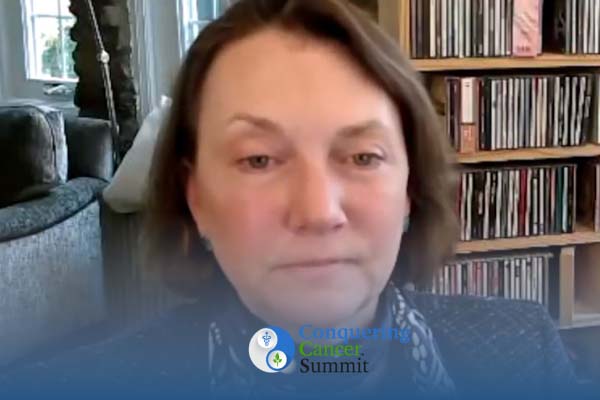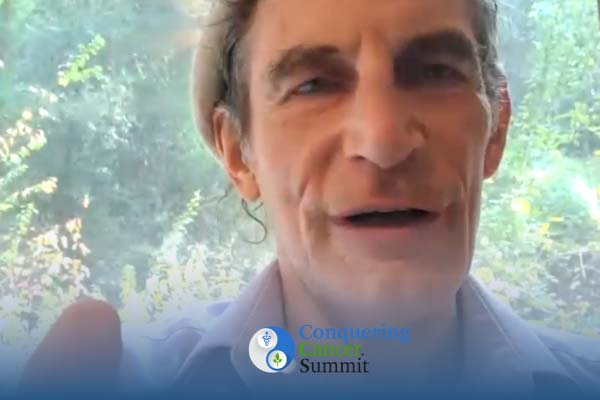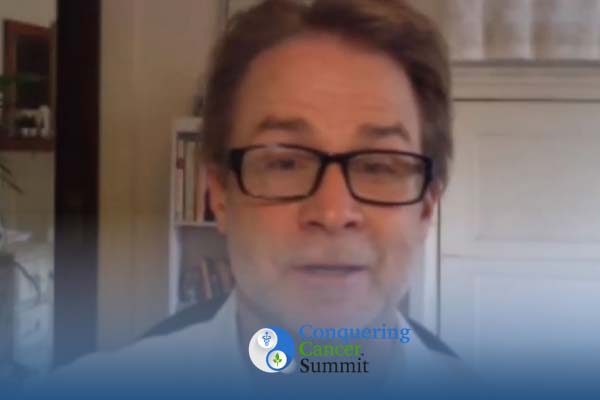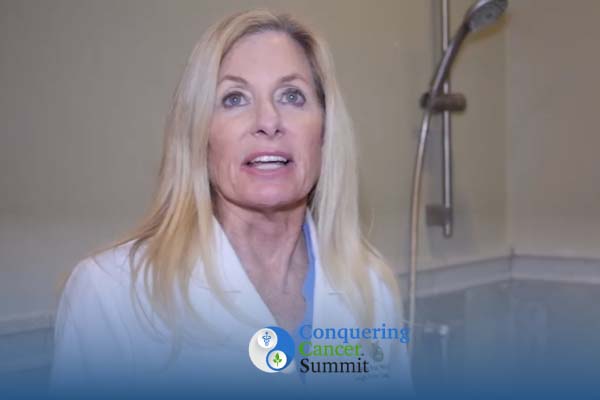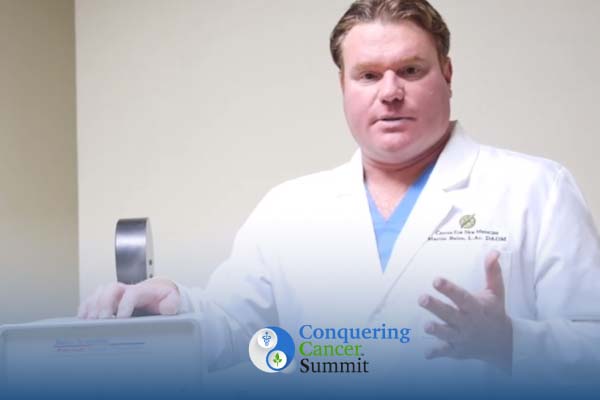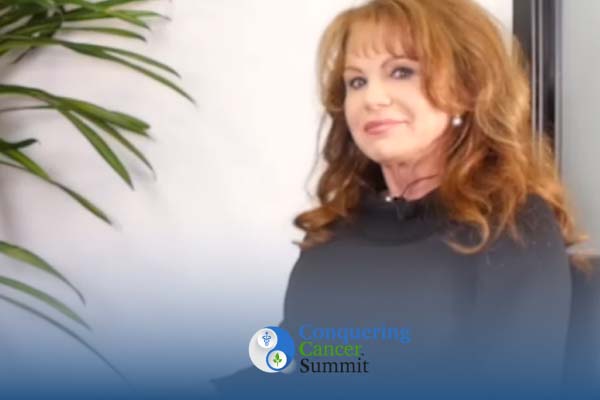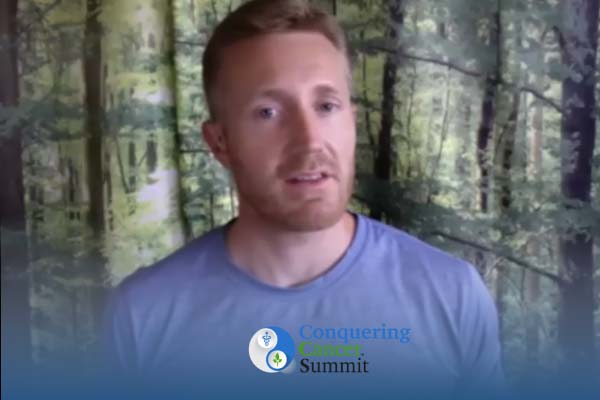Join the discussion below
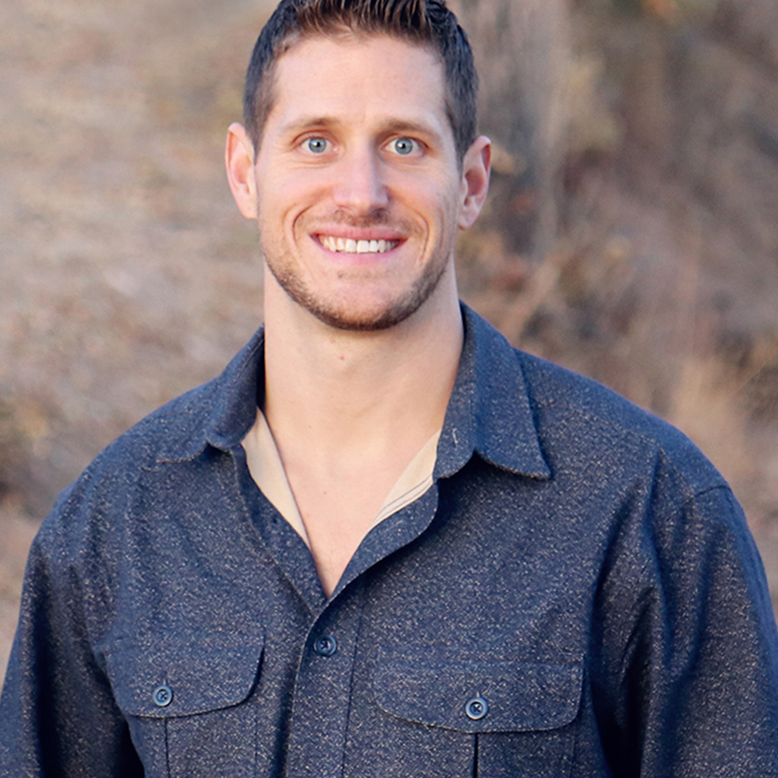
Nathan Crane is an award-winning author, inspirational speaker, plant-based athlete, event producer and 18x award-winning documentary filmmaker. Nathan is the Founder of The Panacea Community, Creator of the Global Cancer Symposium, and Director and Producer of the documentary film, Cancer; The Integrative Perspective. He is also the Director of Strategic... Read More
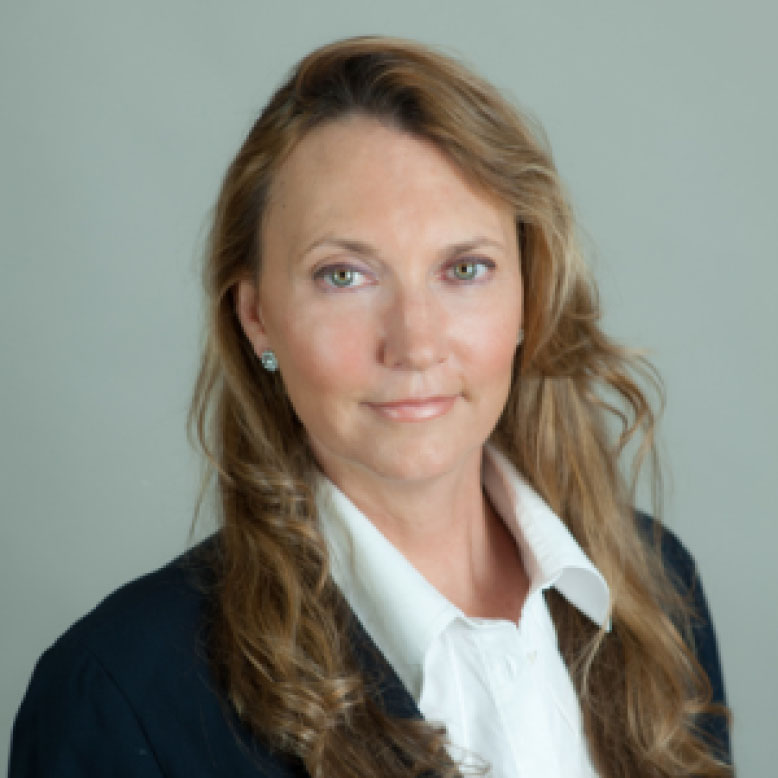
TJ Hills speaks to women and their physicians about improving estrogen health for breast cancer (and recurrence) prevention. She explains how simple nutritional interventions guided by genetic testing can offer relief and answers about our bodies and risks. She is a Breast Cancer Survivor, Patient Advocate, Board Member of the... Read More
How TJ reversed stage 3 breast cancer using nutritional intervention and genetic testing.
Why TJ decided to do surgery and chemotherapy and radiation and how it effected her.
Understanding estrogen metabolism and its role in breast cancer.
How to TJ has extended her life using an integrative approach to her health.
The role of estrogen in cancer and what to do about it.
How to prevent breast cancer by balancing estrogen levels.
Why genetic testing is critical to understanding your risk to breast cancer.
How to recognize if you have sub-optimal estrogen metabolism function.
Related Topics
Arm Lymphedema, Aromatase Inhibitor, Botched Surgeries, Breast Cancer, Cancer, Chemical Castration, Chemotherapy, Diagnosis, Endometrial Cancer, Estrogen Metabolism, Estrogen Receptor Positive, Hypothyroid, Hysterectomy, Integrative Medicine, Menopause, Neutropenia, Oncologists, Osteoporosis, Progesterone Receptor Positive, Prognosis, Quality Of Life, Radiation, Rashes, Remission, Research, Stage Three Breast Cancer, Surviving Surgery, Tamoxifen, Top Hospitals, TreatmentNathan Crane
Hey, it’s Nathan Crane, director of the Health and Healing Club and host of the Conquering Cancer Summit. And today I am honored and excited to welcome you to a very special interview. TJ Hills speaks to women and their physicians about improving estrogen health for breast cancer and recurrence prevention. She explains how simple nutritional interventions guided by genetic testing can offer relief and answers about our bodies and risks. She’s a breast cancer survivor a patient advocate, board member of the Hormonal Cancer Foundation, board member of the Estrogen Gene Tests company and author of My Estrogen Breast Cancer Treatment Diary Improving Estrogen Health. She’s appeared on national TV, radio, major medical conferences not-for-profit in corporate wellness programs and a lot more. Her website is betterestrogen.com. TJ, thank you so much for joining us.
TJ Hills
Thank you for having me, Nathan
Nathan Crane
My pleasure. I’m really excited to hear more about your story and help share with other women empowering solutions for dealing with breast cancer. So maybe you can start there, share with us your experience with breast cancer. When were you diagnosed and what was the diagnosis and the prognosis?
TJ Hills
So I was diagnosed in 2009. I was the first person in multiple generations of my family to ever be diagnosed with cancer. My first inclination, I mean I just had absolutely no idea where it came from, and I was diagnosed with stage three breast cancer. The breast cancer was strongly estrogen receptor positive, progesterone receptor positive. And so at the outset, I was basically termed garden variety breast cancer, and I was told, and this is, mind you 11 years ago, that I had a 70% chance of being dead within five years if I did nothing. And if I did successfully did everything that I was told to do, meaning surgery, chemo, and radiation that I would have a 30% chance of being dead in five years. And these are the standard statistics that someone with “garden variety breast cancer” is given. At the time, 11 years ago, well, I still have young children, but I had twin three-year-olds and a nine-year old and a young husband. And I was just terrified and had no idea where this came from. So that was really where my initial, that was my initial diagnosis.
Nathan Crane
What was your background up to that point? What kinda work were you involved in?
TJ Hills
Right, so I have been doing research of one form or another primarily in finance and economics my entire life. I did not, both my degrees are in international finance and economics and I had no background in biology. But I had an extensive background in research. And actually had a company where that was my primary focus. At the beginning, I was so unprepared for my diagnosis that my first surgery, I just went to a community physician guy. And I had a really botched first surgery, really, really botched first surgery. And so as a result of that, and the implications being that he cut into the middle of the tumor and didn’t put markers in, made the subsequent surgeries really far worse and basically contributed to the cancer spread. So once I learned that, my husband and I kicked into high gear and went the other way overkill. So I live right outside of New York City. I went to every single breast cancer surgeon in all the top hospitals in New York City.
Then I went to all the top oncologists, and I’m originally from Chicago and I consulted with my old internist and she referred me to this guy who was doing bio, he’s a biochemist and who was doing very, very cutting edge studies with the military and had been for several years. And she introduced me to him. So my research skills went into overdrive. And I met him and he introduced me to the whole concept of estrogen metabolism really early on in my diagnosis. And I think that was in many, I was extremely fortunate in meeting him early on because essentially it gave me a clue as to why I wound up with breast cancer. I’ve met a lot of women through my work as a breast cancer prevention advocate and in the doctor’s offices and support groups, et cetera. And one of the big problems with breast cancer, and I think other cancers, is that no one knows where it came from.
So I met women who were terrified of their own cleaning supplies or their shampoo, or whether and every single thing they bought at the grocery store. And I think because more than 80% of all breast cancer patients have no family history, you have this phenomenon where everyone’s wondering, how did this happen to me? I did a lot of other research besides this because I’m outside New York city, or basically in New York city I had the opportunity to do a ton of work. It was a long time ago, but nine, 10 years ago they were looking at cancer vaccines. That’s only kind of now gotten stride. They were doing all kinds of work with STEM cell research. I had a lot of opportunities. And basically this is the part this is the piece that made the most logical sense to me. So after reading hundreds, if not thousands of studies this is kind of the path that I chose to improve that. What at the time was a 30% recurrence risk.
Nathan Crane
So you had surgery, you went through all the complications you had follow-up surgeries, right? And then was the treatment after the surgery was it still recommended for chemotherapy and radiation? And you chose to do that, or you chose not to do that?
TJ Hills
Oh, no, I had everything. So I had multiple surgeries. I had chemotherapy, which I tolerated extremely badly. So I almost died multiple times in chemo. And then my treatment was aborted after my fifth. I wanna say, after my fifth out of eight treatments.
Nathan Crane
You chose to abort it or what happened?
TJ Hills
No, I was. I basically had no white blood cells, literally. I mean, I can give you the gory details about what happened to me in chemo. It’s, basically I would get the infusion, my drug, my blood cells would tank. I didn’t respond to any of the drugs for neutropenia. And I became extremely neutropenic. I would have to go inpatient. They would call it inpatient, but I would spend my whole day getting antibiotic IVs for a week. I would recover. They’d give me the next chemo. I’d do it all again. And then on the fifth one, I didn’t recover. So I wound up hospitalized.
Nathan Crane
How long were you hospitalized for?
TJ Hills
Not that long. It was a few days.
Nathan Crane
Were You doing radiation simultaneously?
TJ Hills
No. Radiation happened, started around a month. They gave me a little bit more time than normal because of how sick I was. But then radiation started about six weeks later.
Nathan Crane
So you did five out of the eight chemotherapy treatments and it just totally destroyed you, your immune system, white blood cell count. But then, you took some time and you did recover from that a bit.
TJ Hills
I did.
Nathan Crane
Were you in radiation?
TJ Hills
And then I did the full 30 days or 28 days whatever it was of radiation. I would say that in the long run so chemotherapy did a lot of damage. So at my first chemotherapy I was 43 at the time I immediately went into what’s called chemical castration. So it was the equivalent of having a hysterectomy. It was just an abrupt menopause. So in addition to everything else I basically had, it’s not the same as a regular menopause where you’re gradually easing into it. It was just boom, one day, I didn’t have any ovarian function. That happened to me in chemo plus all the white blood cell stuff and so. It took me a real long time to recover from that. But in the long run, I would say the longer lasting damage was from radiation.
Nathan Crane
What was some of the damage that has occurred?
TJ Hills
I have hypothyroid because, in radiating this whole area, they radiated my thyroid. So me as a human, I used to be like the Energizer bunny. And now I’m not, now I’m not and I have arm lymphedema from radiation. I’ve got all kinds of rashes that combined with the Tamoxifen sun sensitivity and that’s basically forever. ‘Cause radiation’s half-life is a long long time after my death.
Nathan Crane
So you’re still alive today though which is a blessing, right?
TJ Hills
Yes.
Nathan Crane
After the chemotherapy and radiation. What happened? Did you, obviously you got checkups, they were looking for is the cancer still there. What kind of happened from that point forward?
TJ Hills
In traditional treatment?
Nathan Crane
Yeah.
TJ Hills
I was put on Tamoxifen about the same time as radiation and over time that, I wound up having trouble with my endometrial lining, which is a typical consequence but because I was really young they were trying to get 10 years out of the Tamoxifen. So I wound up having a hysterectomy on completely normal tissue. About less than three years after starting it.
Nathan Crane
And that was supposed to be preventative, is the reason for that or what was the reason?
TJ Hills
Yeah, it was preventative and it was a preventative surgery. I was very grateful for it many, many years later when my mother was diagnosed with endometrial cancer. But yes, that was preventative and I’m still monitored quarterly basically.
Nathan Crane
So you, after the surgeries, chemotherapy radiation Tamoxifen, you went in for checkups did they say the cancer was gone?
TJ Hills
Yeah. I mean, I’m in remission and now I’m on an aromatase inhibitor. I think one of the other big side effects which is super common is combined with the onset of immediate menopause, problems with my bone density. I have osteoporosis, that’s a combination of the estrogen deprivation and everything else. I think, what’s happened to me while it may be a little bit extreme is really common. I think everything that’s happened to me is common.
Nathan Crane
Yeah, it is. And actually, I mean, I was just talking with someone yesterday, who, had just, two friends that went down, did chemotherapy radiation and he chose not to. And one of them actually he knows a person who has the exact same cancer that he did and they died and he didn’t, he’s still alive today. And his quality of life is great. And it’s not to discourage anyone away from it. It’s just, your story is one of many that many can relate to and even worse so. There are many who don’t live past those treatments those treatments actually kill them. Right? So as I said, it’s a blessing you’re alive but obviously you’ve learned a lot of things in research along the way that has contributed to, still being alive today and having even with the long-term side effects and consequences from the treatment that has, still giving you some considerable amount of health, right? Aside from those treatments. What are those things that you’ve been doing naturally holistically nutritionally anything that you’ve been doing that that you feel has been contributing to one not only your recovery from those treatments that sounds like they almost killed you, right? But two has contributed to your ongoing health and remission today.
TJ Hills
As I said, I did a huge amount of research when I was initially diagnosed and chose to focus on improving my estrogen metabolism, dysfunction, which I feel based on everything I’ve learned about it and my family history was definitely the deciding factor in what happened to me. One, almost all of the leading risks for breast cancer are estrogen related unless you’ve had some, unless you have family history. So I’m not counting. I’m just focusing on women who have no family history, no genetics no predisposition and estrogen positive cancers. That’s like 80% close to 80% of all of us. It’s basically how what your total lifetime exposure to estrogen is. So it’s things like, hormonal replacement and old birth control pills that are very heavy. It’s, chemical exposure doesn’t necessarily count. It can be a different thing, but a lot of it is, what’s called endocrine disruption, and all the plastics et cetera, which basically mimic estrogen in your body as if you were taking a drug, if you’re…
Nathan Crane
Xenoestrogens, right?
TJ Hills
Xenoestrogens. Exactly. And so the other thing that basically gives you more of an estrogen load is obesity. So estrogen is produced in your fat tissue the more fat tissue you have, the more of an estrogen load you’re going to have over a lifetime. And all of those things are fine for women who have an estrogen metabolism, that’s functioning. And so I think of it more of like a total load system. So let’s say, you’ve got you smoked for 20 years. You use all kinds of pesticide-laden things on your face. Let’s say you never buy organics and you live, let’s say you’re just have like heavy, heavy exposure to pesticides. You’ve never had any kids. All of these things are gonna make your total estrogen load higher. Stress may compound all of that, but it’s not in on of itself, adding to that.
Nathan Crane
Got it.
TJ Hills
It may make, stress may contribute to how much you weigh, that will increase your estrogen levels. But all, doing all of this is not necessarily going to make for a toxic environment. If you have a functioning metabolism system or detoxification is really what all of this falls under detoxification, ’cause the pathways under which you would excrete all these extra loads including xenoestrogens are the same, right? You’re gonna, it’s all going down the same pathway whether it’s drugs or estrogen or other things I just specifically focus on the particular pathways related to estrogen exposure. If they’re all functioning fine, you’re not going to wind up with the toxic load, which may lead to breast cancer.
Nathan Crane
Even if you’re experiencing more estrogen dominance for long periods of time you’re saying if your detox pathways are fully functioning your estrogen metabolism and your lymphatic system and so forth you’re still not gonna experience breast cancer.
TJ Hills
Well, it’s, you can’t, I don’t know that I would say cancer is a multifaceted wily little beast, right? And this is not the only thing.
Nathan Crane
Sure.
TJ Hills
I feel like it’s a tipping point. You may, have another, you may have a lymphatic excretion problem, right? That, and your estrogen part of that is functioning optimally but your lymphatic system is not. That may be another toxicity, which is why what I kind of focus on is so very narrow because you could also, I mean, take it the other way. You could have a completely messed up estrogen metabolism function but not really be contributing to the total load. Maybe you don’t have a lot of xenoestrogen exposure. Maybe you’ve never taken birth control pills or done IVF or HRT. Maybe you’ve always kind of by accident or by design lived a clean pesticide-laden pesticide, not heavy life. And then you’re fine. You could have every single one of those genetic mutations but not wind up with the toxic load. So I think it’s really a combination of the total load plus your genetic capabilities that would lead to a toxicity event.
Nathan Crane
Got it. So I guess one of the main questions that comes up then is what contributes to improving estrogen metabolism and what contributes to decreasing the function of estrogen metabolism.
TJ Hills
Well, I mean the first thing is stop the extra load. And I would never recommend that if don’t do the panels, right? Because let’s say birth control pills for a teenager might be a really really good idea. So that’s why I’m, an adamant advocate of getting the genetic testing. So the first thing is to stop the extra estrogen exposure as best you can, but without in my opinion, is without having the specific information you could even have breast cancer and still have a functioning metabolism system. I think the most rigorous thing to do is to get the genetic testing ’cause a lot of these things will help people, right? But let’s assume you’ve got your genetic testing. You do have an impairment typically, and most women with estrogen receptor positive breast cancer are going to have these mutations. The first intervention apart from stopping the extra estrogen is DIM or indole-3-carbinol or broccoli mixes. So it’s really, really simple. Essentially what we’re talking about is cruciferous vegetables, cabbage, and broccoli and cauliflower, but you can’t eat your way out of this.
If you’ve had a toxic load, if you’ve already sometime in the past, or currently have a toxic load whether or not you have breast cancer and you have some mutations or disability in your metabolism health you can’t just eat physically eat, to take the equivalent of one of these pills would be like eating an entire room full of broccoli. So I would say that is the foremost intervention is to get, it’s basically, it’s simplifying it. It’s from the mustard family, all of those vegetables are part of the mustard family. Essentially it’s really simple. You’re talking about dramatically increasing your mustard intake.
Nathan Crane
Yeah. I mean, cruciferous vegetables is one of the most well understood and scientifically, researched for, vegetable, group of vegetables that we have today in relationship to it’s direct effect on cancer and all kinds of metabolic functions and so forth in the body, vitamins and minerals and phytonutrients and anti-inflammatories and all these different things that contribute to the body’s ability to detoxification removal of heavy metals from the blood all of these kinds of things, right? That contribute to the body’s ability to heal itself from cancer. And so, I do wanna just add something there though at least from my perspective, you said, “No, you couldn’t get, “all that amount of nutrients from broccoli in a day “you’d have to eat, gallons of broccoli a day.” But what I would add to that. So while I do agree with that, what I would add to that is if you do go on a high or completely plant-based but diet and you are juicing cruciferous vegetables every day and you’re eating huge salads and you’re adding them to big soups and you’re adding them as every part of your day, morning, noon, and night the amount of nutrients and fiber and phytonutrients and phytochemicals and anti-oxidants and anti-inflammatories that accumulate over a period of time.
If you look at all the epidemiological studies from tens of, hundreds of thousands of people for decades around the world it’s very clear that the more you increase these plants as well as the intake of plants in your diet over time your risk of cancer goes down exponentially. So there is something to be said for that that while you might not be able to get, 20 pounds of broccoli into your body a day, it’s also not necessary because you can take the supplements, right? That you’re talking about, but at the same time if you really put a strong focus on your diet you can make a dramatic impact over time. And it’s been shown again and again, that’s just my perspective what I’m sharing. I don’t know if you necessarily agree with that but I did wanna mention that.
TJ Hills
Well, I think, what you’re describing is optimal. And my experience is that, there’s not many people who will over time, consistently conform with that regime, right? If you’re looking at the amounts at least just stick with the US you’re talking about a quarter million people every year who wind up with this diagnosis and that doesn’t count all the people who are still living. So now there’s millions of us. And I would say that there’s a pretty small percentage of them who are following your regime if you can follow that. And there’s a whole bunch of other things that you can add to it, then that would be great. The other thing I would say though, is that if you have stage three cancer, in addition in doing all of that, you might wanna add some of these other things, like do all that and take the pill.
Nathan Crane
And the supplements or the pills you’re recommending again are…
TJ Hills
Well, they’re all gene specific ’cause the other thing is that if you are a cancer survivor and you have these mutations, this is for life, right? I think especially when you talk about juicing and increasing your thing there’s very few people who are gonna be able to maintain that for years and years and years, right? The discipline, especially like, take your, I don’t think there’s such a thing as a typical breast cancer survivor, but let’s just take someone who was eating unhealthily had a, high stress lifestyle, et cetera, then goes through the what I would call the spiritual experience of facing death your eminent death, which normally transforms people. Not always though. And then you go through this emergency stage and then not just you, but the medical profession after several years is kind of done with you. It’s like oh, well, you’re lucky to be alive. And then all the attention kind of disappears. And with it, I see a lot of the discipline. So I’m overgeneralizing.
Nathan Crane
Yeah, no, I mean you’re bringing a good point though. And it is, I mean, there’s ideal scenario. There’s what are we willing to do individually? I mean, I had to go through my own sickness and health challenges and all of that early in life to come to the point where I am now where I eat the way I do and very, conscious of our diet and eat the way basically, I was just explaining for the most part, I still take supplements and, green juices and we still there there’s things that I still do that I think contribute to it’s like, what can you do as much as possible, as effective as possible as often as possible that you will stick with, to contribute to your health and healing and longevity, right? I mean, that’s the key, it’s like there’s one thing to understand knowledge is confidence knowledge. The more you learn, the more confident you can be in your decisions, but knowledge isn’t quite power yet. So we’ve got to take action. We’ve got to implement. So it’s knowledge plus action knowledge plus implementation that gives you the real power to move forward in your life. And of course that never guarantees anybody. That’s gonna live another 10 or 20 years or improved quality of life, who never guarantees anybody they’re gonna reverse cancer or stay in remission but it certainly gives people more hope and more chance and possibility to do so.
TJ Hills
I think that adding that piece of control, because essentially, what you’re doing is you are taking more control of your health and of your cancer and by extension your cancer. And so it’s not just the gym or the indole-3-carbinol or the broccoli mixes. The other things on that list are SAMe if required heavy, heavy antioxidants, and it could be real simple. If you go through every single gene on the panels there’s very specific recommendations but I think they can all get boiled down to, a DIM-PRO vitamin C and stopping the extra estrogen load. Right? And trying to keep a low BMI and that’s it, but that that’s a hard regime. I know for myself I struggle mightily with my weight. And I think a lot of other breast cancer survivors do because of basically the forced menopause. And I think for most Americans removing sugar is a real challenge, right? So what I’ve done over the years as I’ve met more and more women as just trying to simplify this as much as I possibly can.
But I also think that just the ideas whether it’s improving your estrogen metabolism or your detoxification function, whether it’s for estrogen, or the heavy metals or other things ’cause it is ultimately all going down the same pathway gives people a feeling of of control and knowledge. Because as I said, most women don’t know where they got it. I don’t know how much time we have but what I do wanna just mention is that there’s some key clues for who ought to be paying more attention to this besides breast cancer survivors. The conditions that are stereotypically associated with estrogen metabolism suboptimal function are polycystic ovarian disease, fibroid tumors, endometriosis, severe acne that requires medication. And of course, any estrogen cancers running in the family breast, prostate, ovarian, or endometrial.
And I think those things running through the family can give anybody who might be listening to this a clue as to who needs to pay more attention. And the big, big thing that’s really apparent is irregular bleeding for women, but anyone who has these things running through their family, there’s other clues. For example, you can have absolutely no cancer in your background, but you might have a background littered with this stuff, which is basically what I found out. So when I started doing my family history, instead of from a cancer history, my estrogen metabolism dysfunction history, it’s literally everywhere. Like every single person. There’s infertility.
So as you go back infertility can be a euphemism for fibroid tumors ’cause they didn’t know what was going on. They didn’t have the imaging, they didn’t, if you’re going back to your grandparents, or even your older aunts, they didn’t have the imaging. People were just given hysterectomys without full explanations. So if you have a lot of that running in the family infertility, hysterectomys, endometriosis, fibroid tumors et cetera. Then you know that this, this has gotta be more of a concern for you. And if you have irregular bleeding that’s the big warning signal.
Nathan Crane
I was just gonna ask. So the genetic testing that you’re recommending what is the test that women should be taking if they’re concerned or wanna learn more, and what are those markers those genetic markers that they should be watching out for.
TJ Hills
There is. It’s either within the panels it’s either called the detoxification panel or it’s called an estrogen metabolism panel. There’s a few companies that do it. Genaissance, Genova Diagnostic, Nordic Labs, Toolbox Genomics. There’s a few others, and there’s not many but there they are definitely out there. And the gene it’s a specific place on these genes. So CYP1A1, 1B1, 3A4 COMT GSTP1, 2, I mean one M1, T1, MNSOD. They, for example COMT is called the stress gene. It’s a certain place. So these genes are gonna relate to other detoxification functions. For example, you can’t go to 23andMe and pull up your genes off of the 23andMe panel because every single one of these genes has many, many, many places on it. So if you get a 23andMe panel and you pull up the background, or some of the other ones that are over the counter it’s not gonna be testing for that particular detoxification pathway. So I would caution people to really do the full specifically focused detoxification panels.
Nathan Crane
And then, so when they order the genetic testing through any one of these labs that you
recommended, they can do that individually or they need to do it through their health practitioner?
TJ Hills
Mostly it’s through the health practitioner. Some of the companies will basically refer you to someone. And that’s really the big obstacle. It’s a really big obstacle, which is why I try and put in, here are the conditions, if you have breast cancer and you don’t have any of those conditions in your entire family first I’d be real surprised, but you can kind of kind of gauge the urgency of going through the process of getting a doctor to order these tests.
Nathan Crane
And do you guide women through this process of your website?
TJ Hills
I don’t, I don’t. Each genetic testing company, so I used to run an estrogen genetic testing company. And so then we basically had suites of doctors that we could refer people to and we would help enlist, you could come as a patient, we would send it to your doctor, but I’m no longer running that company. So most of the genetic testing companies will help you find a doctor. And if you’re seeing an integrative or functional medicine doctor or a nutritionist or chiropractor, any of the “alternative medicine professionals,” they can order one.
Nathan Crane
Yeah. They can pull your labs, but they need to know…
TJ Hills
And they’re very inexpensive.
Nathan Crane
They need to know how to read them.
TJ Hills
Might be a hundred, $200. It’s, we’re talking for breast cancer survivors or people who have had very significant exposure and their families littered with those conditions. I think it’s well worth the investment ’cause you’re gonna stay on this for a long time.
Nathan Crane
So if you could, knowing what you now know today if you could go back to when you were diagnosed I think you said 2009, right?
TJ Hills
Yeah.
Nathan Crane
Knowing what you know today what would you, if anything, what would you have done differently than surgery, chemotherapy, radiation? Would you have still done that or would you have done something differently before that?
TJ Hills
No, I would not. I mean, I wouldn’t, this is an adjunct to traditional cancer treatment to decrease. So when I was diagnosed it was 30% and then oncotype testing. I did it later. Then my recurrence odds dropped to 13% still really high, 13% dead in five, I mean, those are really high and now there’s a lot more genetic testing that will be done when someone’s initially diagnosed. And I keep running back into those panels finding out what they’re about. And fortunately for me, no, one’s saying that my treatment should have been different. One or two lymph nodes lighter. Your treatment could be different. For older women they’re not even recommending chemotherapy.
Nathan Crane
So you still would have done surgery, chemotherapy and radiation?
TJ Hills
Yeah.
Nathan Crane
And would you have done anything differently before?
TJ Hills
I would have done so much stuff differently before?
Nathan Crane
Like what? Tell us some of those things because we may have women tuning in who have not chosen surgery, chemotherapy, radiation they’re still deciding what treatment protocol they should follow. Not quite sure yet, depending on what their prognosis is and looking for more information and guidance. And obviously it’s different for every person.
TJ Hills
You’re talking about women who have already been diagnosed.
Nathan Crane
Yeah, exactly. And so, what would you have done differently before doing surgery, chemotherapy or radiation?
TJ Hills
Oh, that, no. I mean, I was right at the cusp of where a lot more information was about to be sent down the pipeline. So for example, younger women it’s generally recommended in my case that they have chemotherapy, they’re basically completely changing the protocols for post-menopausal women. So you don’t have to have chemo. You don’t necessarily have to have radiation you have surgery and you just go on one of these aromatase inhibitors for 10 20, for the rest of your life. Anyone who hasn’t started all of that, I would urge them to make sure that their oncologist has looked at all of these. They’re relatively new, right? They’re relatively new. Only in the last few years, Mammaprint different types of genetic tests they have nothing to do with what I was talking about before, which can really refine how much chemo, if any chemo, radiation, if it’s necessary. And then they could avoid everything especially for older women. And what I mean by older…
Nathan Crane
That test is called Mammaprint?
TJ Hills
Yeah, that that’s one of them. There’s three big ones and the other names are not coming to mind, but one of them is called Mammaprint. They’re all basically doing and this information is just relatively new and it’s changing all of the protocols, particularly for women who are parry or post-menopausal. That’s a huge game changer, right? To have surgery and just go on a pill, to just skip skip chemo and radiation. That’s a big game changer. It’s not really changing the story for pre-menopausal women but fortunately that’s still although it’s unfortunately a growing number of women, it’s still the much smaller minority of women who are diagnosed.
Nathan Crane
So would you have done any other personal protocols nutritionally wise before doing any of the conventional treatments to maybe support your treatment outcome?
TJ Hills
I mean, I think 11 years in oncology is like nothing and it’s a really long time. So what I’ve seen is that the American Cancer Society and regular traditional medicine is getting more in tune of the don’t eat sugar, because at some point it’s like why are you even taking Tamoxifen if you’re drinking five Cokes a day? You’re negating the efficacy. If I could do. I think that it was a while before I got serious help with my gut, I had IV antibiotics every single day for an entire summer, IV antibiotics. And it completely destroyed my gut health which then completely destroyed my ability to absorb even the poisons they were giving me.
Nathan Crane
And it destroyed your immune system functions.
TJ Hills
And I don’t talk about it within the constraints of what I’m talking about here, but I think paying attention to your gut health while you’re going through all of this is vital. And it was many years later before I was with a physician who basically did a bunch of panels and improved my gut health so that I could absorb the Tamoxifen and absorb all the supplements that I was taking, because I had an extreme case of leaky gut.
Nathan Crane
We have a great interview with Dr. Tom O’Bryan and a couple of others during this summit. I encourage everyone to go listen to specifically about gut health and what you can do because it is so critical to the overall health and healing of our entire body.
TJ Hills
Yeah. I mean, if you’re gonna, I would for most patients recommend traditional therapy plus this 30%, 12% not acceptable. That’s not an acceptable risk to be hanging over your head. Right? Gee, you’re gonna be dead in 12. You have a 12% chance of being dead in five years, not at 30%. Well, I’m like, Oh, well, I’m real grateful for that. 12% is not great. Right? So I would strongly encourage everybody to be doing everything they possibly can. I think, in general, the real problem and what I really commend you for is that, there’s a crisis period when you’re diagnosed. You weather the crisis, you get through it, you become stable. Most people are not gonna get as sick as me. And then there’s a tendency even in the traditional medical field of just like, okay, you’re done now. And you’re never done. You’re never done. Cancer gone doesn’t exist. You’re either in remission or you’re not.
Nathan Crane
Right. I mean we’re producing cancer cells every single day in our bodies. It’s a matter of does our body is our body functioning well enough to remove those cancer cells as the natural process that it’s designed to do or is the cancer proliferating and basically outnumbering our body’s ability to remove it. So it’s, you’re right. I mean, you’re never done, doesn’t mean you have to live in fear every day just means we have to do everything every day to take care of ourselves and take care of our health. And when we do, we feel better anyway by doing it. So we wanna do it more often. I know that’s true for my case. It’s like, when I eat well, I feel good. I have more energy. I sleep better. So I wanna keep doing that. If I eat bad, I didn’t eat fast food for probably two years. And then 15 years ago I went and had a fast food hamburger from some fast food joint and it made me sick. And that was the last time I ever had fast food again. I was like, “Okay, I don’t need that in my body.” So it’s paying attention and just doing everything we can, as you said.
TJ Hills
Yeah. I mean, you have to maintain the discipline. You have to maintain a discipline. I don’t, I mean, I struggle with it constantly. I don’t struggle with a lot of things ’cause I wasn’t that bad of an eater before but still I’ve always fought the sugar and now even without the sugar, I’m fighting my weight. I basically went into menopause at 43 and that has serious consequences. And I think that’s a pretty typical story for women in my position. But again, just to briefly answer your question if I could do one thing, one thing before all this is I would really improve my gut health. Not only to strengthen my immune system but to strengthen my absorption of all of this, including the poison. If you have to have chemo, let it work. And it’s not gonna work as well as if your gut is destroyed.
Nathan Crane
Yeah. It’s such a good point. I mean, taking care of the gut health is so critical for so many functions. So as we kind of wrap up here maybe you could give us a quick, consolidation of what you shared in terms of the things that contribute the most to excess estrogen production. So again, just if you could repeat those quickly so we know what to avoid as much as possible, right? And then some of the keys and tools and things that you’ve used to, just help your body to function at a higher level and to keep estrogen levels more in balance.
TJ Hills
The critical things of estrogen exposure, which may be good for you. I mean, the bad things are the exposures to the Xenoestrogens. Those are bad for everybody, whether in they’re in cosmetics or food or pesticides on your lawn. I had an oncologist, right in the beginning who asked me what I was using on my lawn which I hadn’t thought of even doing all this work. And he went hysterical when he found out the product name and, so it might kill you but you can’t put any of that on your lawns. It can’t be seeping into your water system. The plastics even water bottles, the sunscreens, the water itself, irrespective of the bottles doing barbecue every single day, for example, on charcoals, then you have the things that you that may or may not be good for you, which is, birth control pills, infertility medications and hormone replacement whether it’s pharmaceutical or natural, those are the things…
Nathan Crane
What do you mean may or may not be good for you with those?
TJ Hills
Well, if you don’t have a problem with this or if you only have one mutation and you don’t have all of this other stuff going on, then hormone replacement is gonna be good for most people birth control pills are gonna be good for most people. They’re gonna, being pregnant when you’re 16 is not optimal. Having a baby when it’s not a good time maybe more destructive than anything else. Right?
Nathan Crane
So you’re talking more about weighing the balance of the good versus the negative impact. You’re not saying birth control pills are good for your body, right? You’re saying that they could be good for your life at that time because you’re not, having a child at 15 or 16 years old. But they’re still are gonna have a negative impact on, biologically on your body.
TJ Hills
Well, no. Well, what I’m saying is that if you can do it, get the genetic testing ’cause then you can make, you’re talking about your lifelong fertility and because and this is a whole many hour topic, but the fertility curve has essentially moved down, right? So girls are starting menses when they’re much younger. And so then therefore they can have, their ovarian function is ending earlier. Basically it’s moved down by two to three years. So for example, an 11 year old in severe pain at 11, right? Is trying to go to not even middle school, but grammar school, right? Then her mom’s making all these decisions and this is happening more frequently and more frequently. And not just here all over the world, these people they need to have a genetic test to figure out how much damaging are you doing? I mean, in and of itself you don’t want an 11 year old on anything like this. Right? But you have to weigh the pros and cons. If that genetic test comes back and says your estrogen detoxification is severely impaired then it’s too bad.
You’re gonna have to figure out how that 11 year old gets through, the rest of middle school and high school with this condition. Right? That’s why I’ve become such a staunch advocate of getting the genetic test. Because if you don’t have cancer and maybe you don’t even have these conditions in your family, like endometriosis and fibroid tumors, or irregular bleeding but you have just what’s happened to us. And it’s again, because it’s xenoestrogens that’s a whole nother topic, but, it would allow you to plan your fertility life. It also allows women to figure out whether or not, they should be doing egg harvesting. It allows them to figure out whether or not they’re going to be so maybe you’re 25 and you know that you have every single one of these mutations you’re not a candidate for fertility treatments.
So then does that, what does that mean to you? Does that mean you’re gonna blow off having children? Are you gonna risk it? Are you gonna harvest your eggs? Are you gonna talk to your doctor about it? Are you gonna take 20 DIM pros a day? What are you gonna do? That’s why I’m such a a heavy advocate because these are fertility decisions. And I’m talking about what happens when you’re younger, but again for menopausal women, HRT can be a really good thing. I wouldn’t recommend the pharma ones, but there’s a whole bunch of other ones that could be life-changing and even protective, but not for women who have estrogen metabolism dysfunction. So that’s why I push the genetic test which is hard to get, right? I mean, it requires work. You gotta get a doctor involved or you have to have a good relationship with your existing doctor and go to them and say, “Can you please order this for me?”
Nathan Crane
So as we finalize here, what words of hope or wisdom or encouragement would you leave our viewers with women with breast cancer really trying to figure out what to do and how to get to the next level of their own healing or women who are just wanting to prevent breast cancer? What are maybe some final words of encouragement you might share with everyone tuning in?
TJ Hills
I would urge them to watch a lot of the professionals that you’ve brought into your program. And I think that at least for me because I was fortunate enough to have the time and the money to invest in functional medicine doctors it can get really, really overwhelming, really overwhelming really quick, insanely expensive and just overwhelming. And what I would say is force yourself to do the research until you find a doctor you trust. Because it can be really hard you have cancer, you’re exhausted, you’re done you don’t wanna deal with it anymore. I would find a medical professional who you think you can work with who’s rigorous and then choose which of these interventions whether it’s estrogen metabolism or focusing on leaky gut, but, find someone who’s methodical because a lot of these professionals will just throw everything in the kitchen sink at you. And then what I’ve seen is a lot of people just throw up their hands and say, “That’s it. “I’m not doing it.” I would, that’s what I would say find someone you trust and try and stick with the program and do as much as you can do and don’t fault yourself if you fall down.
Nathan Crane
Beautiful. Well, thank you, TJ. Thank you for being willing to share your story and your journey with all of us here. I mean, you’re a great example of somebody who’s really followed an integrative approach, right? Who’s done conventional treatment and who’s implemented, natural therapies and nutritional intervention and so forth. I think your story, your own experience is such a great experience to share with so many people here, because what we’re really about here is giving people all of the information, right? People who’ve reversed cancer using purely a natural holistic path. Others who’ve used conventional with, like yourself, with some nutritional therapeutics and so forth. And everybody in between and sharing what’s working in all fields of medicine so that everyone tuning in can have a deeper understanding of all of their options. Right? And that’s the key because when you really know when you understand this more, you understand cancer more you understand its causes more you understand its solutions more and you understand what you actually have access to especially through an integrative approach. You can be so much more empowered to really take back control of your health and make better decisions for your health. So thank you TJ for being here and for sharing all this great information and I just appreciate it. Yeah.
TJ Hills
Thank you for all of your work. You are a beacon of hope, really seriously. Thank you very much. even in preparing to meet you, I learned so much and I have a list right here of all the doctors I’m gonna go watch. So I really thank you for all of the work you’re doing.
Nathan Crane
Awesome. Thank you so much for that. And it’s truly my pleasure. And I wanna thank everyone for tuning in to the Conquering Cancer Summit. Please share this with friends and family. Together, we truly can make a difference for the future of humanity in ending the cancer pandemic. Thank you. And I wish you ultimate health and happiness be well.
Downloads

